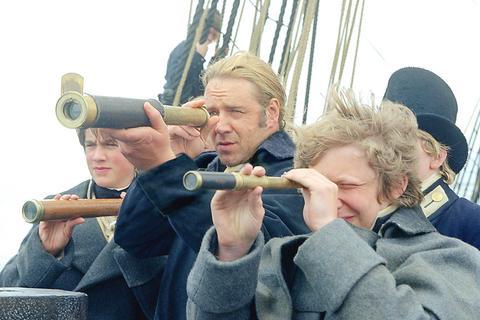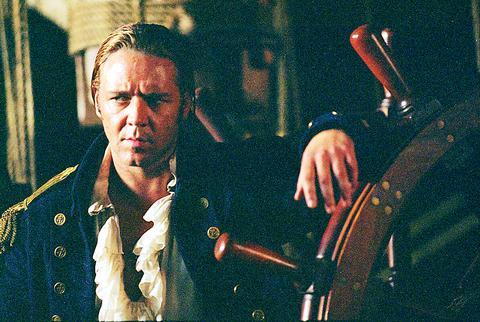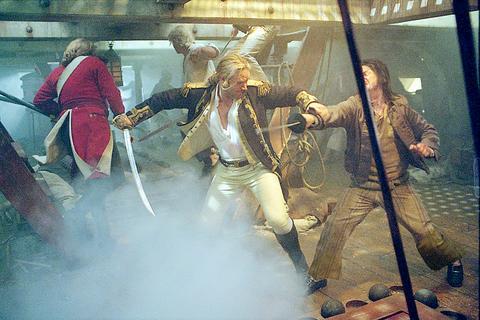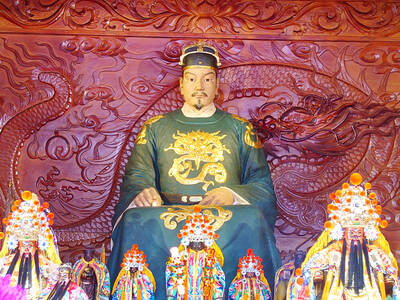"Do you want to see a guillotine in Piccadilly? Do you want your children to grow up singing the Marseillaise?" This is Jack Aubrey, commander of HMS Surprise, rousing the patriotism of his men as they prepare to engage a faster, larger French vessel somewhere off the coast of South America. This ship is England, he proclaims, and Master and Commander: The Far Side of the World, which opens nationwide today, makes his point with magnificent vigor and precision.
This stupendously entertaining movie, directed by Peter Weir and adapted from two of the novels in Patrick O'Brian's 20-volume series on Aubrey's naval exploits, celebrates an idea of England that might have seemed a bit corny even in 1805, when the action takes place. The Surprise is a stiffly hierarchal place of pomp and ritual that is nonetheless consecrated to ideals of fair play, decency and honor and ruled by a man whose claim on the words in the film's title comes, if not by divine right, then at least by demi-godlike force of character.

PHOTO COURTESY OF FOX MOVIES
Of course, life on the Surprise is not all high-minded talk and principled action. Winston Churchill once said that the foundations of British naval tradition consisted of rum, sodomy and the lash. Master and Commander settles for two out of three.

PHOTO COURTESY OF FOX MOVIES
It is tempting to read some contemporary geopolitical relevance into this film, which appears at a moment when some of the major English-speaking nations are joined in a military alliance against foes we sometimes need to be reminded do not actually include France.
The Surprise may be England, but Master and Commander is something of an all-Anglosphere collaboration. Both the director and the star, Russell Crowe, are Australian (Crowe by way of New Zealand), and no fewer than three American studios (Universal, Miramax and 20th Century Fox) paid for the production. The spectacle of British imperial self-defense has been made more palatable for American audiences by a discreet emendation of the literary source: the story has been moved back seven years from the War of 1812, when the British were fighting ... but never mind. Bygones are bygones.

PHOTO COURTESY OF FOX MOVIES
And in any case, the appeal of O'Brian's books to modern audiences goes deeper than their coincidental intersection with present-day diplomacy or politics. Since 1970, when the first instalment was published, the series has gathered a fervent and loyal following that mere topicality could hardly account for. Weir's movie, which follows Jack's command of sharp word and quick action in transporting O'Brian's information-packed pages onto the screen, distills the essence of Aubrey's charisma.
Aubrey (Crowe) is an ideal personification of modern executive authority -- the Harry Potter of the managerial class. His adventures are salted with arcane technical lore and administrative wisdom that resonate deeply with even the most landlubberly middle managers and office workers. Master and Commander, were it not a movie, could be a Powerpoint seminar advertised in an airline magazine: Leadership Secrets of the Royal Navy.
This is not by any means to slight Weir's accomplishment (or, for that matter, O'Brian's); it is, rather, to explain why, in his expert hands, the smallest details of shipboard behavior become so breathlessly absorbing. The battle sequences are filmed with impressive coherence and rigor, but Master and Commander is, if anything, most thrilling between skirmishes, when the complex system of authority and deference that runs the Surprise -- and the personality traits needed to keep it running -- is at the center of attention.
Jack Aubrey's ship is part of a larger bureaucratic system that defines the limits of his autonomy and the particulars of his duty; but he is, within these parameters, free to be creative, even somewhat reckless, in pursuit of his designated goals. His work is occasionally brutal and dangerous, but he clearly loves it; an almost gleeful smile plays across Crowe's meaty face as each battle draws near. Passionate as he is about his vocation, Aubrey is not an utter workaholic. He likes to get drunk and regale the other officers with bad jokes, to play the violin, and to make eyes at a Brazilian beauty who shows up for a few silent seconds to remind the audience of the existence of women.
Who needs them, anyway? Jack does write letters home to his wife, and makes a ribald toast in the officers' mess, but the Surprise is a world of unstinting and diverse manliness. In the best war-movie tradition, Master and Commander is in essence a study of male camaraderie under duress.
The motley ensemble of officers and ordinary seamen display vivid flashes of individuality as they go about their shipboard business. Especially fine are George Innes as a toothless old-timer, Robert Pugh as the Surprise's rotund and pompous Master and Max Pirkis as Blakeney, a young, aristocratic midshipman.
At the center of the picture is the friendship between Aubrey and Stephen Maturin, the ship's surgeon, played by Paul Bettany.
Bettany, sensitive, quick-witted and easygoing, makes a fine sidekick for the fierce Crowe, and this is his second tour of duty. In A Beautiful Mind his character, John Nash's imaginary roommate, was a man of letters to Crowe's man of numbers; this time, he is a man of ideas, and as such the perfect foil for Crowe's man of action. Aubrey and Maturin, who play stately cello and fiddle duets in the captain's cabin after meals, argue about the nature of power and the competing claims of scientific inquiry (Maturin is a naturalist as well as a physician) and military duty.
Not that Maturin is a sissy: he can handle a sword when he needs to, and, in one of Weir's many dazzling close-up set pieces, he performs abdominal surgery on himself. Nor is Aubrey simply a brute; he shows both a keen tactical mind and surprising delicacy of feeling. But he is, above all, the embodiment of English practicality (Maturin's background, by the way, is Irish and Catalan), ruled by instinct and habit rather than intellect.
Weir's direction is appropriately old-fashioned, which is not to say that it is staid. It is rare, nowadays, to see a story of such scale and complexity filmed with such clarity, swiftness and attention to detail. O'Brian's command of nautical lore and maritime history was always remarkable, but it also tended to oversaturate his narratives with data. In Weir's version, every nail, every rope, every teacup and brass button is in more or less its place, but rather than feeling fussy and antiquarian, as so many Hollywood costume pageants do, Master and Commander hums with humor, passion and life.

On a harsh winter afternoon last month, 2,000 protesters marched and chanted slogans such as “CCP out” and “Korea for Koreans” in Seoul’s popular Gangnam District. Participants — mostly students — wore caps printed with the Chinese characters for “exterminate communism” (滅共) and held banners reading “Heaven will destroy the Chinese Communist Party” (天滅中共). During the march, Park Jun-young, the leader of the protest organizer “Free University,” a conservative youth movement, who was on a hunger strike, collapsed after delivering a speech in sub-zero temperatures and was later hospitalized. Several protesters shaved their heads at the end of the demonstration. A

In August of 1949 American journalist Darrell Berrigan toured occupied Formosa and on Aug. 13 published “Should We Grab Formosa?” in the Saturday Evening Post. Berrigan, cataloguing the numerous horrors of corruption and looting the occupying Republic of China (ROC) was inflicting on the locals, advocated outright annexation of Taiwan by the US. He contended the islanders would welcome that. Berrigan also observed that the islanders were planning another revolt, and wrote of their “island nationalism.” The US position on Taiwan was well known there, and islanders, he said, had told him of US official statements that Taiwan had not

The term “pirates” as used in Asia was a European term that, as scholar of Asian pirate history Robert J. Antony has observed, became globalized during the European colonial era. Indeed, European colonial administrators often contemptuously dismissed entire Asian peoples or polities as “pirates,” a term that in practice meant raiders not sanctioned by any European state. For example, an image of the American punitive action against the indigenous people in 1867 was styled in Harper’s Weekly as “Attack of United States Marines and Sailors on the pirates of the island of Formosa, East Indies.” The status of such raiders in

As much as I’m a mountain person, I have to admit that the ocean has a singular power to clear my head. The rhythmic push and pull of the waves is profoundly restorative. I’ve found that fixing my gaze on the horizon quickly shifts my mental gearbox into neutral. I’m not alone in savoring this kind of natural therapy, of course. Several locations along Taiwan’s coast — Shalun Beach (沙崙海水浴場) near Tamsui and Cisingtan (七星潭) in Hualien are two of the most famous — regularly draw crowds of sightseers. If you want to contemplate the vastness of the ocean in true